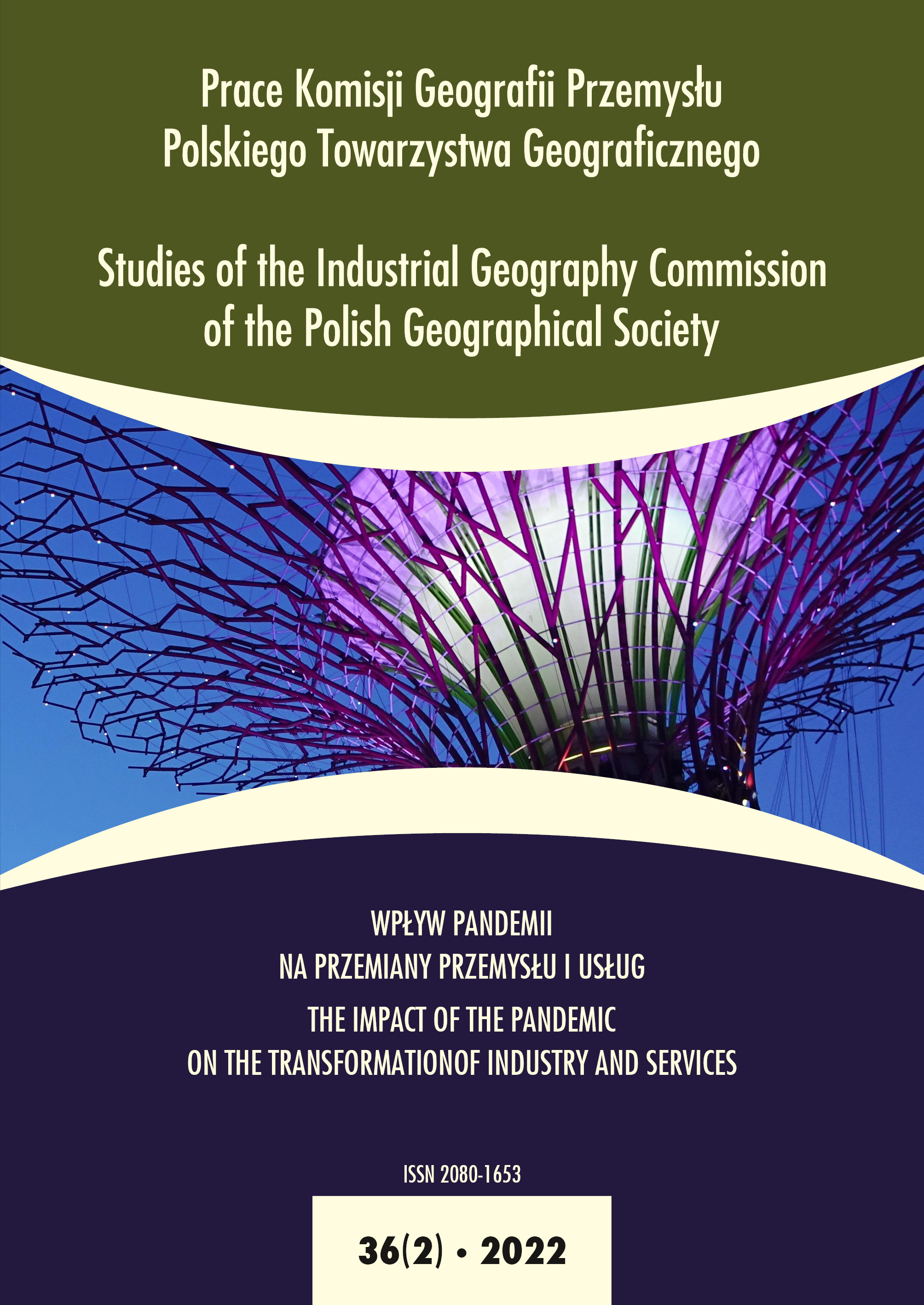Koncepcja badania społeczno-ekonomicznych konsekwencji i wyzwań pandemii
DOI:
https://doi.org/10.24917/20801653.362.2Słowa kluczowe:
interesariusze gospodarki regionalnej, kryzys COVID-19, wrażliwość gospodarek regionalnych, polityka regionalnaAbstrakt
Kryzys wywołany pandemią COVID-19 ujawnił niedociągnięcia i słabości gospodarek regionalnych. W związku z tym powinien on być postrzegany jako impuls do zmian, mających na celu budowanie większej odporności na podobne sytuacje. Celem artykułu jest przedstawienie autorskiej koncepcji badania społeczno-ekonomicznych konsekwencji kryzysu wywołanego pandemią COVID-19 oraz wyzwań pojawiających się w obliczu zidentyfikowanych problemów rozwojowych. Z przeprowadzonych badań wynika, że do niezbędnych wartości, które trzeba wzmocnić, aby stworzyć nowoczesną i odporną gospodarkę regionalną, należą kompetencje, wiedza naukowa i technologiczna, kapitał finansowy oraz bezpieczeństwo publiczne i społeczne. W celu wzmocnienia wartości priorytetowych warto przyjąć określone style działań, które pozwolą na efektywne wykorzystanie endogenicznych zasobów regionu. Są nimi elastyczność, dywersyfikacja, komunikacja i współpraca. Autorzy posługują się metodą analizy naukowej i dedukcją, ponadto odwołują się do własnych obserwacji zjawisk społeczno-gospodarczych oraz krytycznej analizy literatury i dokumentów strategicznych.
Downloads
Metrics
Bibliografia
Baldwin, R., Weder di Mauro B. (2020). Economics in the Time of COVID-19. a VoxEU.org eBook. CEPR Press, 13–14.
Barua, S. (2020). Understanding Coronanomics: The Economic Implications of the Coronavirus (COVID-19) Pandemic. Pobrane z: https://papers.ssrn.com/sol3/papers.cfm?abstract_id=3566477/ (01.04. 2020).
Benanav, A. (2021). Service work in the pandemic economy. Service Work in the Pandemic Economy. International Labor and Working‑Class History, 99, 66–74.
Briguglio, L., Cordina, G., Farrugia, N., Vella, S. (2009). Economic Vulnerability and Resilience: Concepts and Measurements. Oxford Development Studies, 37(3), 229–247.
Capello, R., Caragliu, A. (2016). After crisis scenarios for Europe: Alternative evolutions of structural adjustments. Cambridge Journal of Regions, Economy and Society, 9(1), 81–101.
Capello, R., Caragliu, A., Fratesi, U. (2015). Spatial heterogeneity in the costs of the economic crisis in Europe: Are cities sources of regional resilience?. Journal of Economic Geography, 15(5), 951–972.
Chapple, K., Lester, B. (2007). Emerging Patterns of Regional Resilience, Working Paper 2007–13. Berkeley: Macarthur Foundation Research Network on Building Resilient Regions, Institute for Urban and Regional Development, University of California.
Christopherson, S., Clark, G.L., Whiteman, J. (2015). Introduction: The Euro crisis and the future of Europe. Journal of Economic Geography, 15(5), 843–853.
Deller, S., Watson, P. (2016). Did regional economic diversity influence the effects of the great recession?. Economic Inquiry, 54(4), 1824–1838.
Ezcurra, R., Rios, V. (2019). Quality of government and regional resilience in the European Union. Evidence from the Great Recession. Papers in Regional Science, 98(3), 1267–1290.
Fernandes, N. (2020). Economic Effects of Coronavirus Outbreak (COVID-19) on the World Economy. Pobrane z: https://papers.ssrn.com/sol3/papers.cfm?abstract_id=3557504/ (22.04.2020).
Gunay, S., Kurtulmus, B.E. (2021). COVID-19 social distancing and the US service sector: What do we learn? Research in International Business and Finance,56, ID: covidwho-1036240.
Hassink, R. (2010). Regional resilience: a promising concept to explain differences in regional economic adaptability?. Cambridge Journal of Regions, Economy and Society, 3, 45–58.
Hill, E.W., Wial, H., Wolman, H. (2008). Exploring Regional Resilience, Working Paper 2008–04. Berkeley: Macarthur Foundation Research Network on Building Resilient Regions, Institute for Urban and Regional Development, University of California.
Hudson, R. (2010). Resilient regions in an uncertain world: wishful thinking or practical reality, Cambridge Journal of Regions, Economy and Society, 3(1), 11–25.
Kudełko, J., Wałachowski, K., Żmija, D. (2020). Gospodarka regionalna w obliczu kryzysu wywołanego pandemią COVID-19. Warszawa: Difin.
Lu, L., Peng, J., Wu, J., Lu, Y. (2021). Perceived impact of the Covid-19 crisis on SMEs in different industry sectors: Evidence from Sichuan, China. International Journal of Disaster Risk Reduction, 55(24), 1–9.
Martin, R. (2010). Roepke lecture in economic geography – rethinking regional path dependence: Beyond lock‑in to evolution. Economic Geography, 86, 1–27.
Martin, R., Sunley, P. (2006). Path dependence and regional economic evolution. Journal of Economic Geography, 6, 395–437.
Mohlmann, J.L., Garretsen, J.H., de Groot, H.L.F. (2011). The crisis sensitivity of European countries and regions: Stylized facts and spatial heterogeneity. Cambridge Journal of Regions, Economy and Society, 4(3), 437–456.
Pukin‑Sowul, P., Ostrowska, A. (2021). The COVID-19 pandemic and Poland’s macroeconomic situation. Zeszyty Naukowe Małopolskiej Wyższej Szkoły Ekonomicznej w Tarnowie, 51(3), 47–59.
Ramey, V.A. (2016). Macroeconomic Shocks and Their Propagation. Handbook of Macroeconomics. 1st ed. Vol. 2. Elsevier B.V, 71–162.
Rios, V., Gianmoena, L. (2020). The Link Between Quality of Government and Regional Resilience in Europe. Journal of Policy Modeling. Doi: https://doi.org/10.1016/j.jpolmod.2020.02.005
Skrabacz, A. (2021). Wpływ pandemii koronawirusa na stan bezpieczeństwa społeczno‑ekonomicznego Polaków. Bezpieczeństwo. Teoria i Nauka, 2 (XLIII), 17–33.
Stojczew, K. (2021). Ocena wpływu pandemii koronawirusa na branżę turystyczną w Polsce. Prace Naukowe Uniwersytetu Ekonomicznego we Wrocławiu, 65(1), 157–172.
Taleb, N.N. (2007). The black swan. The impact of highly improbable. New York: Random House.
Turner II, B.L., Kasperson, R.E, Matson, P.A., McCarthy, J.J., Corell, R.W., Christensen, L., Eckley, N., Kasperson, J.X., Luers, A., Martello, M.L., Polsky, C., Pulsipher, A., Schiller, A. (2003). A Framework for Vulnerability Analysis in Sustainability Science. Proceedings of the National Academy of Sciences of the United States of America, 100(14), 8074–8079.
Walker, B., Salt, D. (2006). Resilience Thinking. Sustaining ecosystems and people in a changing world. Washington–Covelo–London: ISLANDPRESS.
Yicheol H., Stephan J. (2015). The Economic Resilience of U.S. Counties during the Great Recession. The Review of Regional Studies, 45, 131–149.
Zaucha, J., Brodzicki, T., Ciołek, D., Komornicki, T., Mogiła, Z., Szlacha, J., Zaleski, J. (2015). Terytorialny wymiar wzrostu i rozwoju. Warszawa: Difin.
Pobrania
Opublikowane
Jak cytować
Numer
Dział
Licencja
Prawa autorskie (c) 2022 Prace Komisji Geografii Przemysłu Polskiego Towarzystwa Geograficznego

Utwór dostępny jest na licencji Creative Commons Uznanie autorstwa – Bez utworów zależnych 4.0 Międzynarodowe.
Artykuły publikowane są zgodnie z warunkami licencji Creative Commons (CC BY-ND 4.0; uznanie autorstwa-bez utworów zależnych).

